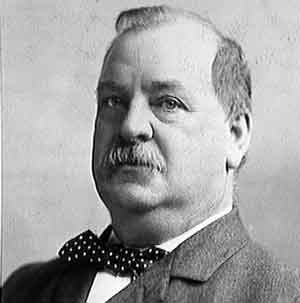Part 22 of My Presidential Review Series

Getting back on track, we reach Grover Cleveland. Cleveland was the only president to serve two nonconsecutive terms. Between 1860 and 1912, he was the only Democrat elected to the presidency. Cleveland vetoed more bills than any other president; in fact, more bills than all 21 presidents before him combined. He was the first former president to survive into the 1900's. Cleveland served March 4, 1885 to March 3, 1889 for his first term.
Replacing the presidential succession act of 1792, the Presidential Succession Act of 1886 stated that no the death, incapacitation, or resignation of both the President and Vice President, the line of succession would fall to the Cabinet in the chronological order of each department's creation. It was superseded by the Presidential Succession Act of 1947, and eventually by the Twenty-Fifth Amendment.
Cleveland vetoed hundreds of pension and private relief bills as unwarranted drains on the Treasury. The vetoes drew criticism from the Grand Army of the Republic, the Civil War veterans organization. Many of the vetoes were justified; one person asked for a pension for an injury sustained while intending to enlist.
Cleveland signed the Interstate Commerce Act, which created the Interstate Commerce Commission, the first federal regulatory agency. The ICC was to see that interstate railroad rates "reasonable and just" and to put an end to rebates and other practices by which railroads had favored large corporations over small businesses and farmers. The commission lacked enforcement powers, though, until the presidency of Theodore Roosevelt.
Responding to Helen Hunt Jackson's A Century of Dishonor which criticized America's treatment of the Indians, Congress passed and Cleveland approved the Dawes Severalty Act, which granted citizenship and full title to defined parcels of reservation land to Indians willing to renounce tribal allegiance.
The Hatch Act, a compliment to the Morril Act, provided federal funds for the establishment of agricultural experiment stations under the direction of agricultural colleges in the various states.
In his third message to Congress, Cleveland argued for a reduction in the tariff, the issue on which he would wage his reelection. Republicans responded by calling the high tariff a protection of domestic manufactures and the wages of labor. No action was taken during Cleveland's term.
To Be Continued...